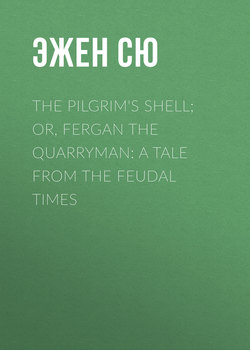Читать книгу The Pilgrim's Shell; Or, Fergan the Quarryman: A Tale from the Feudal Times - Эжен Сю - Страница 9
PART I.
THE FEUDAL CASTLE
CHAPTER VIII.
THE CHAMBER OF TORTURE
ОглавлениеThe dungeon of Bezenecq the Rich and his daughter, vaulted and floored with stone slabs like the other subterranean cells, but located on the second story of that redoubtable structure, received a somewhat better light from its narrow loop-hole. In the center of the cell stood a gridiron, six feet long, three wide, raised a good deal above the floor, and constructed of iron bars placed slightly apart from each other. Chains and rings, fastened to the gridiron, served to keep the victim in position. Near this instrument of punishment rose two other engines of torture, devised with ingenious ferocity. The one consisted of a projecting iron bar, in the nature of a gibbet about seven or eight feet above the floor, and terminating in an iron carcan that opened and closed at will. A heavy stone, weighing about two tons, and furnished with a ring and a strap to hang it by, lay at the foot of the gibbet. The other engine had the appearance of a gigantic prong, sharp and turned back similar to those used by butchers to hang their quarters of beef on. The slabs of the flooring, covered everywhere else with greenish moisture, wore a blood-red tint under the prong. Opposite to this instrument of punishment, there was grossly sculptured on the wall, a sort of grinning mask, hideous, half beast, half human; its eyes and the cavity of its gaping mouth, resembled deep black holes. Finally, close to the door of the cell stood a wooden box full of straw, and there lay the daughter of the townsman of Nantes, colorless like a corpse, and frozen with terror. At times her body shook with convulsive shivers, other times she remained motionless, her eyes shut, without, therefore, however, her tears ceasing to stream down her cheeks. Bezenecq the Rich, seated on the edge of the straw bed, his elbows on his knees and his forehead hidden in his hands, was saying to himself: "The seigneur of Plouernel… A descendant of Neroweg!.. Strange, fatal encounter!.. Woe is us!"
"Oh, father," murmured the maid in a fainting voice, "this encounter is our sentence of death."
"The sentence of our ruin, but not of our death. Calm yourself, poor child, the seigneur of Plouernel knows not that our obscure family, descended from the Gallic chieftain Joel, who made a head against Cæsar, has been at strife with his own all through the past ages, since the Frankish conquest. But when that bailiff pronounced the name of Neroweg VI, which I had not heard mention during this ill-starred journey, and when, questioned by me, that man answered his master belonged to the ancient Frankish family of Neroweg, established in Auvergne since the conquest of Gaul by Clovis, I no longer had any doubts, and, despite myself, I shuddered at the recollection of our family records, which our father once read to us at Laon, and that have remained in that country, in the hands of Gildas, my elder brother."
"Oh, why did our grandfather leave Brittany. Our family lived there so happy."
"Dear child, our grandfather, who lived near the sacred stones of Karnac, the cradle of our family, could no longer endure the oppression of the Breton seigneurs, who had grown to be as cruel as their Frankish fellows. He sold his little havings, and embarked with his wife at Vannes on a merchant vessel bound for Abbeville. He settled down in that city, where he set up a modest trade. Later, my father moved into the province of Picardy, and settled at Laon, where my elder brother Gildas still carries on the currier's trade. Coming by sea from Abbeville to Nantes to traffic in the articles of our trade, manufactured in Laon, I became acquainted with your mother, the daughter of the merchant to whom I was directed. Her parents did not wish to part from her. They made me promise not to leave Nantes. I became the partner of my wife's father, and grew rich in the business. Your mother then died. You were still a child. Her death was the greatest sorrow of my life. But you were left to me. You grew in gracefulness and beauty. Everything smiled upon me again. I was happy. And behold us now, while yielding to the wishes of your grandmother – " and Bezenecq interrupted himself with a cry of despair: "Oh, it is frightful!"
"But how could we have merited the terrible punishment that seems reserved to us?"
"Oh," replied the bourgeois of Nantes with a sigh, "my happiness rendered me forgetful of the misfortune of our brothers! I was selfish!"
"Dear father, you surely exaggerate the faults or errors of your life."
"Millions of serfs and villeins people the lands of the seigneurs and the clergy. Among them, some drag along a painful existence, that ends in death from exhaustion and misery; others are hanged from the patibulary forks. Those unhappy people are Gauls like ourselves. If some townsmen live in tranquility in the cities, when they have for seigneur so gentle a master as Simon of Nantes, millions of serfs and villeins, on the other hand, are devoted to all the miseries of life, and victims to the seigniories and the Church."
"But, father, it did not depend upon you to alleviate the ills of these wretched folks."
